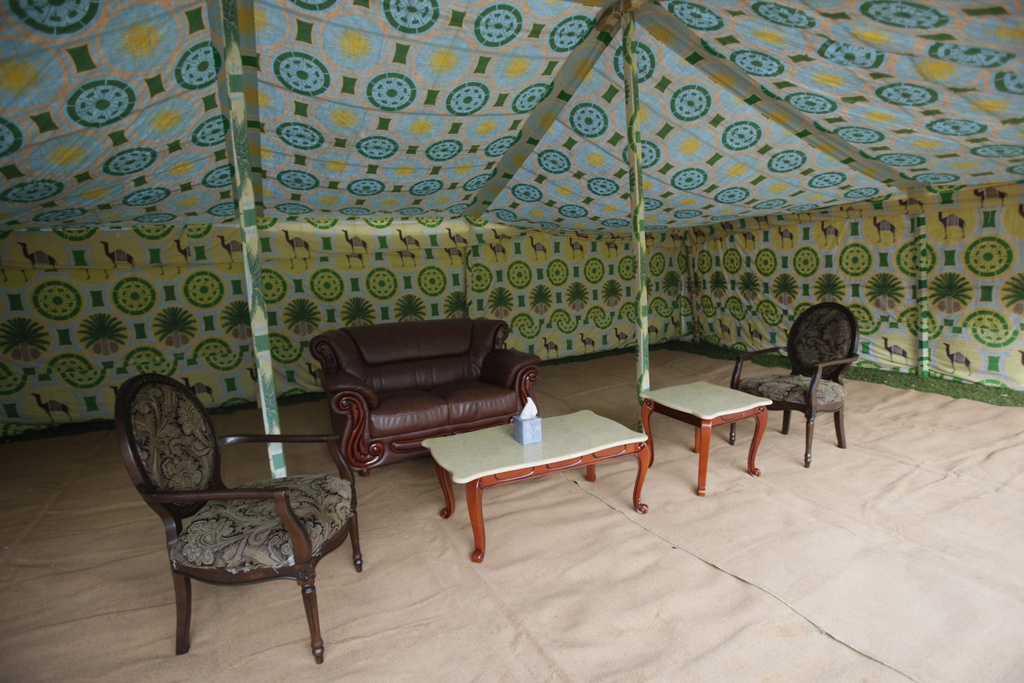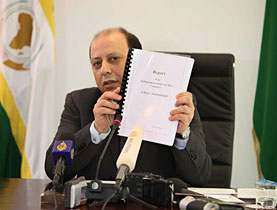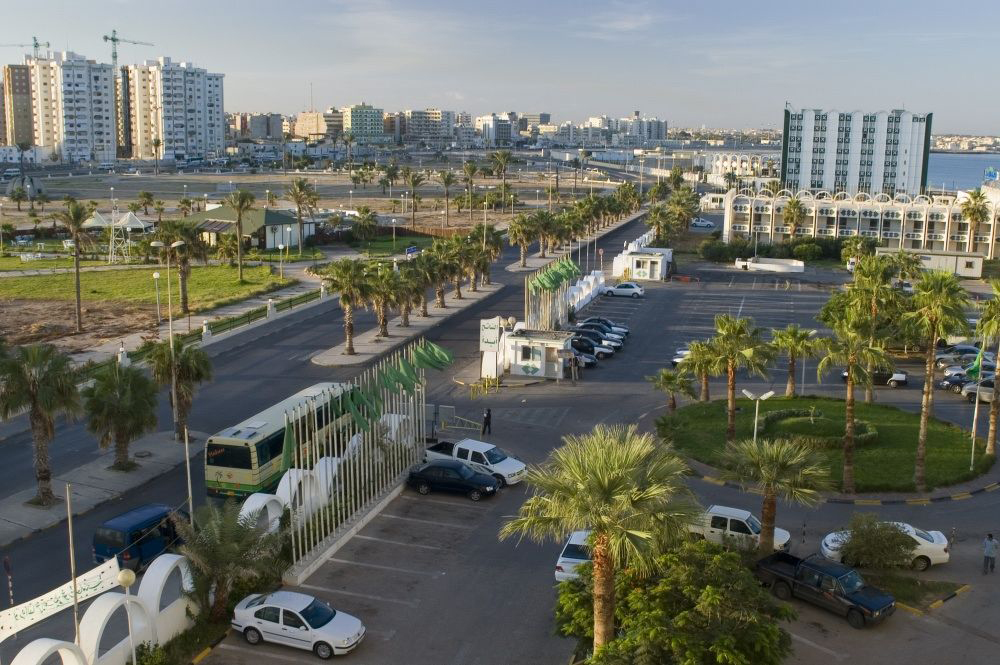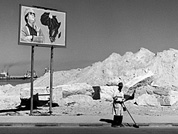Libyan acquittal leads to cautious optimism

Observers say the overturning of a Swiss businessman’s Libyan jail term for visa violations is a positive step in the resolution of the Tripoli-Bern diplomatic spat.
On Sunday a Libyan appeal court cleared Rachid Hamdani of being in the country illegally and overturned his 16-month prison sentence. The court is due to decide on other charges against him and that of fellow countryman Max Göldi this week.
Libya’s prosecution of Hamdani and Göldi has been at the centre of a diplomatic tussle between the two countries linked to the arrest of Libyan leader Moammar Gaddafi’s son Hannibal in Geneva in July 2008 on charges, later dropped, of mistreating two domestic employees.
The Swiss businessmen were sentenced in November 2009 to 16-month jail terms and fined $1,500 (SFr 1590) each by a lower court for overstaying their visas.
The pair still face trial on charges of operating a business without a licence.
Their problems started a few days after the Hannibal affair blew up. They were detained briefly before being released on bail, but have been prevented from leaving the country for almost the past year and a half.
In recent months they have been holed up at the Swiss embassy in Tripoli.
“I think Libya wants to close this affair; we are moving towards a resolution [of the rift],” Luis Martinez, a specialist on North Africa and the Middle East at the CERI research centre in Paris, told swissinfo.ch.
“The Libyans want to get out of this problem in a formal, legal manner and don’t want to give the impression that it’s just personal bullying or totally arbitrary.”
Hasni Abidi, director of the Study and Research Center for the Arab and Mediterranean World, agreed the Libyan regime wanted to send a political “signal” to Switzerland showing that its justice was “autonomous and independent” from the political authorities.
Crucial week
Göldi has also appealed against his jail sentence and appeared in court last Thursday for the first time since the case began, as both men had feared they might be arrested on leaving the embassy. A ruling on Göldi’s appeal is due on February 4.
Verdicts on the illegal business charges are due on February 6 for Göldi and February 7 for Hamdani.
On January 24, Hamdani appeared in court after the Gaddafi Foundation, run by the Libyan leader’s son Seif al-Islam, provided assurances he would not be arrested.
A Western diplomat in Tripoli, speaking to AFP on condition of anonymity, said Hamdani’s successful appeal was “a first step on the part of the Libyans towards the Swiss.”
If Göldi also wins his appeal February 4, “the judiciary’s decisions could mean a lifting of the ban on the two men leaving Libya,” the diplomat added.
Emmanuel Altit, a French lawyer for the pair, told swissinfo.ch he could not comment right now but said the recent developments were “not too bad”.
A Swiss foreign ministry spokesman confirmed that the jail term against Hamdani had been dropped, but also declined to comment on the decision.
Motivating factors
Abidi felt the court appearances of the two businessmen, who had previously refused to show three times, had been a “positive gesture” and had speeded things up.
“If all goes well we are therefore moving towards a legal solution,” he told Le Temps newspaper. “A political way out of this crisis still needs to take shape, however.”
Martinez felt it was very difficult to know what precise factors, like Switzerland’s restricted Schengen visa policy for applications from Libya, might be behind the recent developments.
“But as soon as the rift gained wider public and international attention it increased the pressure on the Libyan authorities,” he said. “The Libyans don’t want to again be accused of being the ‘lame ducks’ of the Mediterranean.”
Tempered optimism
The human rights organisation Amnesty International, which has been campaigning for their release, tried to temper excitement over an imminent release.
“It’s an important step, but with Libya we are used to ups and downs,” said Amnesty Switzerland’s spokeswoman Manon Schick. “We shouldn’t jump to conclusions that everything has been solved.”
Prevented from leaving the country for the past 563 days, the two businessmen are “not very well”, on medication and are exhausted by this difficult rollercoaster situation away from their families, Amnesty says.
“A verdict like this gives them hope,” said Schick. “But neither of them is blind to the fact that this is a political trial and justice is just a stage in the resolution that has to be found between the Swiss and Libyan governments. The two businessmen still have the impression they are puppets in this conflict.”
Simon Bradley, swissinfo.ch
July 15, 2008: Hannibal Gaddafi and his wife Aline are arrested at a Geneva hotel after reports that they have mistreated two servants. After two nights in detention, the couple are charged with inflicting physical injuries against the servants. The Gaddafis are released on bail and leave Switzerland. The servants are later compensated and charges withdrawn.
July: Two Swiss nationals are arrested in Libya. Swiss businesses are forced to close their offices and the number of Swiss flights to Tripoli is cut. Bern sends a delegation to Libya.
January 2009: Talks are held in Davos with Seif al-Islam Gaddafi, one of the Libyan ruler’s sons. A diplomatic delegation travels to Tripoli.
April: Hannibal and his wife, along with the Libyan state, file a civil lawsuit against the Geneva authorities in a Geneva court.
May: Foreign Minister Micheline Calmy-Rey visits Libya, reporting “significant progress”.
June: Libya withdraws most of its assets from Swiss bank accounts.
August: Merz, who meets the Libyan prime minister but not Gaddafi, apologises in Tripoli for the arrest.
September: Libya does not let the two Swiss nationals leave the country, breaking a promise made to Merz that they would be free to return to Switzerland before September 1. Gaddafi and Merz meet on the sidelines of the UN General Assembly in New York. The two nationals disappear after undergoing a medical check-up in Tripoli.
October: A Swiss delegation returns empty-handed from Tripoli. A 60-day limit for normalising relations between Switzerland and Libya passes with no sign of the two Swiss hostages held by Tripoli.
November: Swiss ministers suspend treaty seeking to normalise relations with Tripoli and say they will pursue visa restrictions for Libyans.
December: Two businessmen sentenced to 16 months in prison and fined SFr1,600 for overstaying their visas. .

In compliance with the JTI standards
More: SWI swissinfo.ch certified by the Journalism Trust Initiative





You can find an overview of ongoing debates with our journalists here. Please join us!
If you want to start a conversation about a topic raised in this article or want to report factual errors, email us at english@swissinfo.ch.